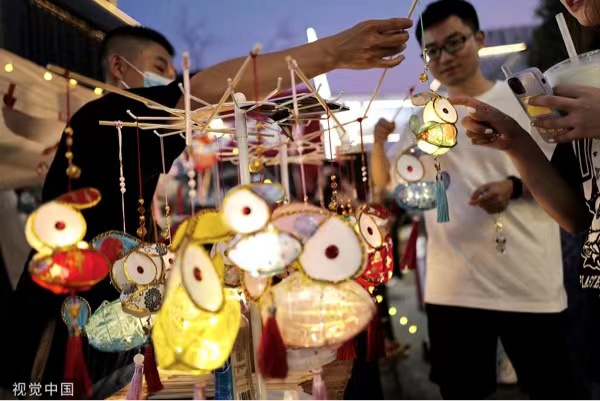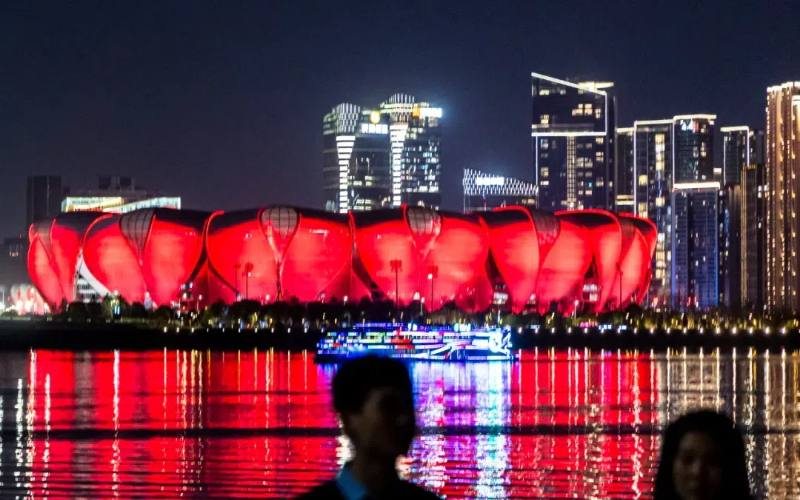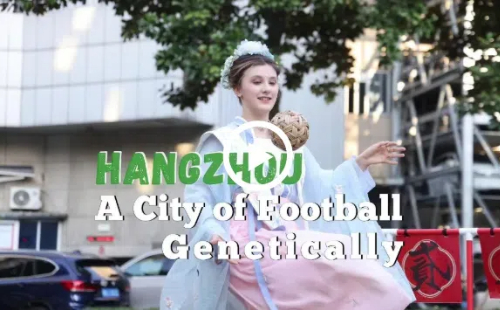Hangzhou initiative aims to light up the night

People hang out at a night market in Hangzhou, Zhejiang province on Aug 21, 2022. [Photo/VCG]
Hangzhou, an e-commerce and digital hub in Zhejiang province, is striving to build the mega city into an international shopping center with a booming night economy.
To boost consumption and encourage market entities to develop a night economy, a draft plan was released recently on the website of the Hangzhou Bureau of Commerce outlining 15 measures and policies to be implemented between 2023 and 2025.
Under the plan, businesses from the catering, retail, entertainment and culture sectors that are open during the night — from 10 pm to 6 am — will be given a one-time subsidy up 500,000 yuan ($70,000), depending on company size. Each urban district is encouraged to set up a midnight-economy block.
Promotion via livestreaming is encouraged. Business circles and blocks with new livestreaming facilities will be given a one-time subsidy up to 1 million yuan.
Meanwhile, market entities are encouraged to use new technologies such as augmented reality, virtual reality and mixed reality to develop a metaverse shopping scenario.
A metaverse shopping platform for Hangzhou will be developed to achieve year-round shopping both online and offline. The leading research company will be given a subsidy up to 30 million yuan over three years.
The plan also encourages the creation of convenient 15-minute-walk living circles to meet the demands of a modern community.
"These measures are very realistic and meaningful for boosting consumption. They are expected to improve the quantity and quality of night consumption," said Ying Tianyu, head of the Department of Tourism and Hotel Management at Zhejiang University.
Ying thinks the night economy is an important indicator of the openness and vibrancy of a city. The concept is about more than just the economy, however. It also covers cultural activities that enhance people's happiness.
Regarding the development of new technologies, Ying said, they will enrich and improve the shopping experiences of consumers, and they are less dependent on physical space.
Ying and his team have established a comprehensive index to systematically evaluate the night economy performance of 90 districts and counties in Zhejiang.
"To some extent, people can genuinely relax during night after work in the day, thus night economy significantly influences people's pursue of a better life," he said.
Liu Wanlin, a 31-year-old resident of Hangzhou said there are lots of restaurants and places to go after 10 pm.
"There are light illuminations around West Lake at night, and every 2 kilometers there's a police station, so I feel safe going out at night," she said.
Liu said the Xintiandi block of the downtown district of Gongshu, where she lives, has both indoor and outdoor facilities and has attracted increasing numbers of people since its opening.
"Besides homes and restaurants, it also has a circus," she said.
Neighboring the Hangzhou Esports Center, the Xintiandi block was listed as a national nighttime culture and travel area by the Ministry of Culture and Tourism in August.
"I think it is good to develop the night economy, and flexible working hours should be encouraged — such as working four and a half days a week so we will have more leisure consumption time," Liu said.
Referring to the new shopping scenarios, she said it's interesting to try out and see if clothes fit without actually trying them on.
Between January and October, retail sales of consumer goods in Hangzhou hit 590 billion yuan ($82.4 billion), which represents 5.5 percent growth year-on-year.
This is not the first time Hangzhou has rolled out policies to boost the night economy. In July 2020, the Hangzhou Bureau of Commerce proposed to build at least 10 night economy landmarks across the city. It said it would enrich night tourist resources and encourage participation in sports at night.





 play
play